五年级英语(下)各单元知识点总结
五年级下册英语知识点归纳整理总结
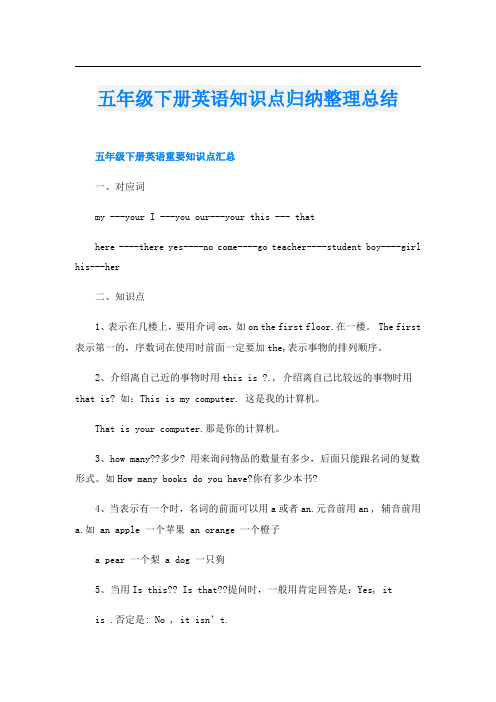
五年级下册英语知识点归纳整理总结五年级下册英语重要知识点汇总一、对应词my ---your I ---you our---your this --- thathere ----there yes----no come----go teacher----student boy----girl his---her二、知识点1、表示在几楼上,要用介词on,如on the first floor.在一楼。
The first 表示第一的,序数词在使用时前面一定要加the,表示事物的排列顺序。
2、介绍离自己近的事物时用this is ?., 介绍离自己比较远的事物时用that is? 如:This is my computer. 这是我的计算机。
That is your computer.那是你的计算机。
3、how many??多少? 用来询问物品的数量有多少,后面只能跟名词的复数形式。
如How many books do you have?你有多少本书?4、当表示有一个时,名词的前面可以用a或者an.元音前用an , 辅音前用a.如 an apple 一个苹果 an orange 一个橙子a pear 一个梨 a dog 一只狗5、当用Is this?? Is that??提问时,一般用肯定回答是:Yes, itis .否定是: No , it isn’t.三、句子:1、This is the teacher’s office.这是老师办公室。
2、That is my classroom.那是我的教室。
3、Go to the library. Read a story-book..去图书馆。
读故事书。
4、Is this the library? Yes, it is.这是图书馆吗?是的。
5Is that the art room? The art room is on the second floor.那是美术室吗?不是,美术室在二楼。
精通版五年级英语下册全册单元知识小结

精通版五年级英语下册全册知识总结Unit 1 Welcome to our school!单元小结一、核心词汇1.名词music音乐way路;道路library图书馆2.代词we我们our我们的3.动词meet相遇;开会welcome欢迎have有like喜欢4.其他all所有;全部many许多also也;同样very much非常please请二、拓展词汇1.动词borrow(向某人、从某人)借2.短语science lesson科学课English lesson英语课meeting room会议室science lab科学实验室language lab语言实验室art club美术(艺术)俱乐部music club音乐俱乐部borrow books借书have a meeting开会paint a picture(用颜料)绘画play the piano弹钢琴三、核心句型1. Welcome to our school! 欢迎来到我们学校!解读:这是一个迎接宾客的礼貌用语,是一个祈使句,其后跟地点名词。
举一反三: Welcome to our city! 欢迎来到我们城市!Welcome to China! 欢迎来到中国!2. We o ften borrow books from the library. 我们经常从图书馆里借书。
解读:这是一个描述某人经常做某事的句型。
举一反三: They often borrow some English books from Beijing Library. 他们经常从北京图书馆里借一些英语书。
3. — How many English lessons do you have in a week? 你们一周有多少节英语课?— We have three. 我们有三节。
解读:这是用来询问对方有多少节课的句型。
举一反三: — How many PE lessons do you have in a week? 你们一周有多少节体育课?— We have five. 我们有五节。
冀教版五年级英语下册知识点2024
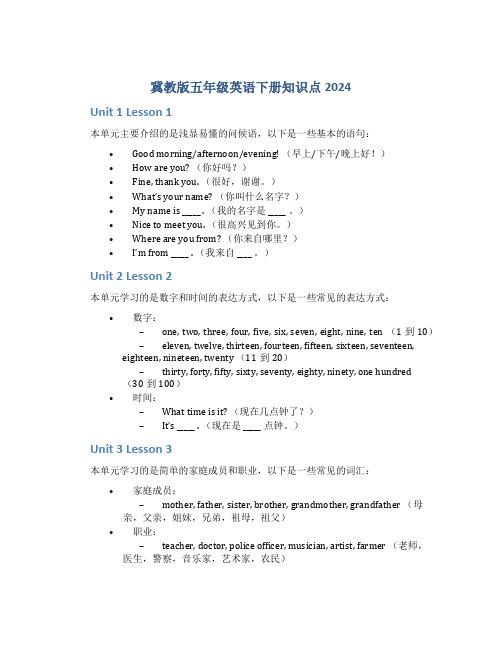
冀教版五年级英语下册知识点2024Unit 1 Lesson 1本单元主要介绍的是浅显易懂的问候语,以下是一些基本的语句:•Good morning/afternoon/evening! (早上/下午/晚上好!)•How are you? (你好吗?)•Fine, thank you. (很好,谢谢。
)•What’s your name? (你叫什么名字?)•My name is _____ . (我的名字是 _____ 。
)•Nice to meet you. (很高兴见到你。
)•Where are you from? (你来自哪里?)•I’m from _____ . (我来自 ____ 。
)Unit 2 Lesson 2本单元学习的是数字和时间的表达方式,以下是一些常见的表达方式:•数字:–one, two, three, four, five, six, seven, eight, nine, ten (1到10)–eleven, twelve, thirteen, fourteen, fifteen, sixteen, seventeen, eighteen, nineteen, twenty (11到20)–thirty, forty, fifty, sixty, seventy, eighty, ninety, one hundred (30到100)•时间:–What time is it? (现在几点钟了?)–It’s _____ . (现在是 _____ 点钟。
)Unit 3 Lesson 3本单元学习的是简单的家庭成员和职业,以下是一些常见的词汇:•家庭成员:–mother, father, sister, brother, grandmother, grandfather (母亲,父亲,姐妹,兄弟,祖母,祖父)•职业:–teacher, doctor, police officer, musician, artist, farmer (老师,医生,警察,音乐家,艺术家,农民)Unit 4 Lesson 4本单元学习的是简单的交通工具和指示方向的用语,以下是一些常见的词汇:•交通工具:–car, boat, bus, bike, train, plane (汽车,船,公共汽车,自行车,火车,飞机)•指示方向:–Go straight. (直走。
英语五年级下册笔记

英语五年级下册笔记一、单词部分。
1. Unit 1.- 四会单词(要求会听、说、读、写)- do morning exercises(做早操):这是一个动词短语,“do”在这里表示“做”,“morning exercises”是“早操”的意思。
- eat breakfast(吃早饭):“eat”是“吃”,“breakfast”是“早餐”。
- have…class(上……课):例如“have English class(上英语课)”,“have”在这里表示“进行、从事”。
- play sports(进行体育运动):“play”有“玩、参加(比赛或运动)”的意思,“sports”是“体育运动”的复数形式。
- eat dinner(吃晚饭):和“eat breakfast”结构相同,“dinner”指“晚餐”。
- 三会单词(要求会听、说、读)- usually(通常;一般):是一个频度副词,用来描述事情发生的频率。
- Spain(西班牙):国家名称,首字母要大写。
- late(晚;迟):例如“be late for(迟到)”。
2. Unit 2.- 四会单词。
- spring(春天):季节名称,还可以表示“泉水”“跳跃”等其他意思,但在本单元表示季节。
- summer(夏天):注意其发音,字母“u”发/ʌ/音。
- autumn(秋天):也可以说“fall”,尤其在美国英语中。
- winter(冬天):这四个季节单词是描述天气和季节相关话题的基础词汇。
- season(季节):是一个可数名词,复数形式是“seasons”。
- 三会单词。
- picnic(野餐):常和“have a picnic(去野餐)”搭配使用。
- go on a picnic(去野餐):这是一个常用短语。
- pick(摘;采集):例如“pick apples(摘苹果)”。
- pick up(捡起;拾起):有不同的含义,在这里是“捡起”的意思。
新精通版五年级下册小学英语全册单元知识点小结
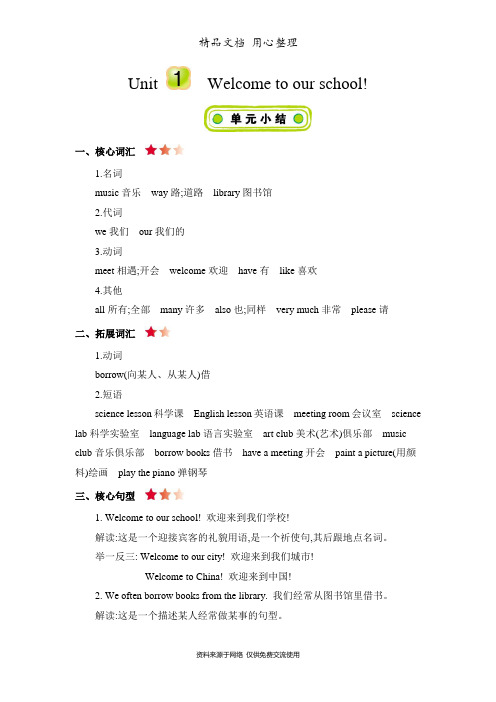
Unit Welcome to our school!一、核心词汇1.名词music音乐way路;道路library图书馆2.代词we我们our我们的3.动词meet相遇;开会welcome欢迎have有like喜欢4.其他all所有;全部many许多also也;同样very much非常please请二、拓展词汇1.动词borrow(向某人、从某人)借2.短语science lesson科学课English lesson英语课meeting room会议室science lab科学实验室language lab语言实验室art club美术(艺术)俱乐部music club音乐俱乐部borrow books借书have a meeting开会paint a picture(用颜料)绘画play the piano弹钢琴三、核心句型1. Welcome to our school! 欢迎来到我们学校!解读:这是一个迎接宾客的礼貌用语,是一个祈使句,其后跟地点名词。
举一反三: Welcome to our city! 欢迎来到我们城市!Welcome to China! 欢迎来到中国!2. We often borrow books from the library. 我们经常从图书馆里借书。
解读:这是一个描述某人经常做某事的句型。
举一反三: They often borrow some English books from Beijing Library. 他们经常从北京图书馆里借一些英语书。
3. —How many English lessons do you have in a week? 你们一周有多少节英语课?—We have three. 我们有三节。
解读:这是用来询问对方有多少节课的句型。
举一反三: —How many PE lessons do you have in a week? 你们一周有多少节体育课?—We have five. 我们有五节。
五年级英语下册1-4单元知识点汇总

五年级英语下册1-4单元知识点汇总**Unit 1: Our School****Vocabulary:*** classroom: 教室 * library: 图书馆 * playground: 操场* canteen: 食堂 * office: 办公室 * teacher's desk: 讲台 * computer room: 电脑室 * art room: 美术室 * music room: 音乐室**Sentences:*** This is our school. 这是我们的学校。
* Our school has a big playground. 我们的学校有一个大操场。
* We have many books in our library. 我们的图书馆里有很多书。
* The teachers work in the office. 老师们在办公室工作。
**Grammar:*** Use "has" or "have" to describe possession. 使用“has”或“have”来描述所属关系。
* Use "our" to refer to possession of the group. 使用“our”来指代群体的所属。
**Unit 2: My Family****Vocabulary:*** family: 家庭 * father: 父亲 * mother: 母亲 * brother: 兄弟 * sister: 姐妹 * grandparent: 祖父母 * uncle: 叔叔 * aunt: 阿姨**Sentences:*** This is my family. 这是我的家庭。
* I have a happy family. 我有一个幸福的家庭。
* My father is a doctor. 我的父亲是一名医生。
【思维导图】译林版(三起)五年级下册英语知识点整理

【思维导图】译林版(三起)五年级下册英语知识点整理五年级的孩子们,你们好!为了帮助大家更好地掌握英语知识,我们将五年级下册的英语知识点整理成了思维导图。
通过思维导图,你们可以清晰地看到各个知识点之间的关系,从而更好地理解和记忆。
一、Unit 1主题:Goldilocks and the three bears知识点:人物:Goldilocks, three bears地点:house动词:is, are, have, eat, sleep, look, feel形容词:big, small, hard, soft, hot, cold,delicious介词:in, on, under, behind句型:How is/are ? It's/They're日常用语:Hello/Hi! Good morning/afternoon/evening! How are you? I'm fine, thank you. And you?二、Unit 2主题:A telephone call知识点:形容词:happy, sad, angry, tired, bored介词:at, in, on, under, behind句型:What can/can't do? can/can't日常用语:Can you ? Yes, I can./No, I can't. What are you doing? I'm三、Unit 3主题:Asking the way知识点:名词:road, street, park, cinema, library, museum介词:to, from, on, in, at句型:Where is/are ? It's/They're日常用语:Excuse me. How can I get to ? Go straight along and turn at It's about metres/metres from here.四、Unit 4主题:Road safety知识点:动词:is, are, have, can, must, may, should名词:road, street, traffic lights, crossing, zebra, sign介词:on, in, at, near句型:You must/may/should You can't日常用语:Look left/right. Cross the road. Be careful.五、Unit 5主题:A PE lesson动词:is, are, have, can, do, play, jump, run名词:PE, class, teacher, student, ball, net介词:in, at, on, under, over句型:What are you doing? I'm日常用语:Let's ! Come on! Well done!六、Unit 6主题:An interesting country知识点:动词:is, are, have, can, go, visit, see, do名词:country, city, town, village, mountain,river介词:in, at, on, under, behind日常用语:Hello! How are you? I'm fine, thank you. And you?七、Unit 7主题:A busy day知识点:名词:day, week, month, year, school, home, park介词:in, at, on, under, behind句型:What do you do on ? I日常用语:What time do you get up? I get up at八、Unit 8主题:At the weekends动词:is, are, have, can, go, visit, see, do名词:weekend, park, cinema, library, museum, shop介词:in, at, on, under, behind句型:What do you do at the weekends? I日常用语:Let's go to ! I'd like to Can we ? Yes, we can./No, we can't.九、Unit 9主题:Chinese festivals知识点:动词:is, are, have, can, go, visit, see, do名词:festival, Spring Festival, MidAutumn Festival, Dragon Boat Festival介词:in, at, on, under, behind句型:What do you do at ? I日常用语:Happy New Year! Happy MidAutumn Festival! Happy Dragon Boat Festival!十、Unit 10主题:Review and check知识点:复习前面所学知识点十一、五年级的孩子们,通过思维导图,你们可以更好地掌握五年级下册的英语知识点。
人教版新起点英语五年级下册全册单元知识点

Unit 1 Keep Healthy(保持健康)一、单元词汇too much 太多candy 糖果go to bed 去睡;就寝early 早exercise 锻炼tired 困倦的;疲倦的drink 喝;饮before 在......之前dirty 肮脏的always 总是stomachache 胃疼headache 头疼toothache 牙痛a lot of 大量;许多sleepy 困的;欲睡的subject 学科mark 分数advice 建议more 更多的二、单元句型1. A: What s wrong? 怎么了?B: I ve got a stomachache. 我肚子疼。
2. A: I often have stomachaches. What should I do?我经常肚子疼。
我应该怎么办?B: You should drink some water. 你应该喝些水。
3. Here you are. 给你。
4. A: Do you eat a lot of candy? 你吃了很多糖吗?B: Yes, I eat some after every class. 是的,我每节课后都吃很多。
5. You shouldn t eat too much candy. 你不该吃太多糖。
6. A: Do you wash your hands before eating? 你饭前洗手了吗?B: Not always. 不总洗。
7. You shouldn t eat with dirty hands. 你不该用脏手吃饭。
8. You should always wash your hands before eating.你应该坚持饭前洗手。
9. I always feel tired and sleepy. 我总觉得很累很困。
10. I have some advice for you. 我给你一些建议。
五年级下册英语1到4单元知识点

五年级下册英语1到4单元知识点Unit 1: My DayIn this unit, students will learn how to talk about daily routines and use time expressions.Vocabulary:- Brush your teeth- Wash your face- Have breakfast- Go to school- Do homework- Go to bedCommon Phrases:- What time do you wake up?- I wake up at 7 o'clock.- What do you do in the morning?- I brush my teeth and wash my face.Grammar:- Present Simple Tense: Students will practice using the present simple tense to talk about daily routines.Unit 2: My FamilyIn this unit, students will learn how to introduce family members and describe their appearance and personality.Vocabulary:- Mother- Father- Sister- Brother- Grandmother- GrandfatherCommon Phrases:- Who is she?- She is my mother.- What does your father look like?- He is tall and has brown hair.Grammar:- Present Continuous Tense: Students will practice using the present continuous tense to describe what family members are doing.Unit 3: My SchoolIn this unit, students will learn how to describe their school, classroom, and school subjects.Vocabulary:- Classroom- Desk- Whiteboard- Library- Playground- Math- Science- ArtCommon Phrases:- Where is your classroom?- My classroom is on the second floor.- What is your favorite subject?- My favorite subject is art.Grammar:- Can / Can't: Students will practice using "can" and "can't" to talk about abilities and limitations.Unit 4: My HobbiesIn this unit, students will learn how to talk about their hobbies and interests.Vocabulary:- Play soccer- Draw- Dance- Sing- Swim- Play chessCommon Phrases:- What do you like to do in your free time?- I like to play soccer with my friends.- Do you enjoy painting?- Yes, I love to draw and paint.Grammar:- Present Simple Tense: Students will review the present simple tense to talk about hobbies and interests.。
五年级下册英语各单元知识点(译林版)
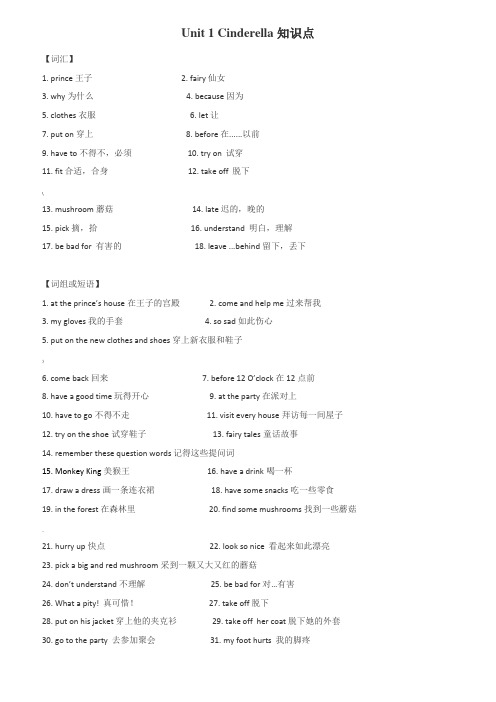
Unit 1 Cinderella知识点【词汇】1. prince 王子2. fairy 仙女3. why 为什么4. because 因为5. clothes 衣服6. let 让7. put on 穿上8. before 在......以前9. have to 不得不,必须10. try on 试穿11. fit 合适,合身12. take off 脱下\13. mushroom 蘑菇14. late 迟的,晚的15. pick 摘,拾16. understand 明白,理解17. be bad for 有害的 18. leave ...behind留下,丢下【词组或短语】1. at the prince’s house在王子的宫殿2. come and help me 过来帮我3. my gloves 我的手套4. so sad 如此伤心5. put on the new clothes and shoes 穿上新衣服和鞋子》6. come back 回来7. before 12 O’clock在12点前8. have a good time 玩得开心 9. at the party 在派对上10. have to go不得不走 11. visit every house拜访每一间屋子12. try on the shoe试穿鞋子13. fairy tales童话故事14. remember these question words 记得这些提问词15. Monkey King美猴王16. have a drink喝一杯17. draw a dress画一条连衣裙 18. have some snacks吃一些零食19. in the forest 在森林里20. find some mushrooms找到一些蘑菇。
21. hurry up快点22. look so nice 看起来如此漂亮23. pick a big and red mushroom采到一颗又大又红的蘑菇24. don’t understand不理解 25. be bad for 对…有害26. What a pity! 真可惜!27. take off 脱下28. put on his jacket 穿上他的夹克衫29. take off her coat 脱下她的外套30. go to the party 去参加聚会31. my foot hurts 我的脚疼练一练1. A: _Who_ is the boy in blue? B: He’s Mike.2. A: _Whose_ wallet is it? B: It’s mine.3. A: _Where_ is the diary? B: It’s under the chair.—4. A: _When_ is the Christmas Day? B: It’s on the 25th of December.5. A: _How much_ are the pens? B: They are 25 yuan.6. A: _ What colour _ is the flower? B: It’s blue.7. A: _What day_ is it today? B: t’s Sunday.8. A: _What date_ was it yesterday? B: It was the 13th of October.9. A: _How about_ this red one? B: It’s beautiful.10. A: _How far_ is it from here? B: It’s about two kilometre away.11. A: Can I have some paper and some crayons?,B: _What for_?A: I want to make a kite.12. A: _Which_ one is fatter, the blue one or the red one? B: The blue one.13. A: _How old_ is your cousin? B: He’s 15 years old.14. A: _What time_ do you have dinner? B: At 6 o’clock.15.A: How many shoes do you have? B: I have 20 shoes.【语音】本单元学习的是字母组合dr的发音。
冀教版(三起)五年级英语下册全册知识点汇总

冀教版(三起)五年级英语下册全册知识点汇总UNIT Going to Beijing一、核心词汇1.和动作相关的单词jump跳;跳跃run跑dance跳舞sing唱;演唱sit坐stand站立;直立look看;瞧see看见;明白;会见(过去式为saw) draw画cry哭;哭泣;喊叫sleep睡觉;入睡talk交谈;讨论2.和食物相关的单词tea茶water水candy糖果3.方位介词down向下;朝下;沿着up向上,在上面4.人物名词man男人woman女人baby婴儿boy男孩girl 女孩5.其他now现在who谁picture图画;照片hungry饥饿的sorry 对不起,不好意思(道歉时用)6.动词短语look at看(某人或某物) look out of从……向外看二、拓展词汇1.其他和食物相关的单词noodles面条dumplings饺子hamburger汉堡包bread面包2.其他常见时间副词yesterday昨天tomorrow明天三、核心句型1.Please don’t run! 请不要跑!解读:此句是祈使句的否定形式,表示不许做某事。
举一反三: Please don’t open the window.It’s cold outside.别开窗户,外面很冷。
Don’t speak in class.课上不要说话。
2.I want to sing! 我想唱歌!解读:此句是表达某人想做某事的句型。
举一反三: I want to visit my grandmother.我想去看望我奶奶。
She wants to go swimming.她想去游泳。
3.— Jenny, what are you doing now?詹妮,你现在正在做什么?— I am drawing a picture.我正在画画。
解读:这是询问某人正在做什么的句型。
举一反三: — What is she doing?她正在做什么?— She is watching TV.她正在看电视。
五下1234单元英语总结

五下1234单元英语总结一、单元概述五下1234单元是小学英语教材中的重要部分,内容涵盖了语言基础知识、听说读写等方面。
通过学习这些单元,学生们可以扩大词汇量,提高朗读和听力技能,培养对英语的兴趣和自信心。
本篇文档将对五下1234单元的内容进行总结,帮助学生们更好地了解和掌握这些知识点。
二、具体内容1. 第一单元第一单元主要学习了关于问候和介绍的知识。
学生们通过这个单元,学会了用英语与人打招呼和自我介绍。
同时,还学习了一些关于国家和语言的表达方式。
2. 第二单元第二单元着重学习了一些关于家庭的词汇和表达方式。
学生们可以描述家庭成员的姓名和职业,并能够用简单的句子表达家庭成员之间的关系。
3. 第三单元第三单元以“学校生活”为主题,学生们学习了一些关于学校和课堂的词汇,还学会了问答有关上学日常活动的问题。
4. 第四单元第四单元主要学习了一些与食物和饮料相关的词汇。
学生们能够用简单的句子表达喜欢和不喜欢的食物,并学会了与他人一起点餐的基本表达方式。
三、学习方法学习英语需要良好的学习方法和习惯。
下面给出几点建议,帮助同学们有效地学习五下1234单元的内容:1.多与他人练习对话:与他人练习对话是提高口语表达能力的有效方法。
可以与同学们一起组队练习对话,并互相纠正发音和语法错误。
2.多做课后习题:课后习题是巩固所学知识的好方法。
可以找同学之间相互出题答题,也可以向老师请教不懂的地方。
3.利用多媒体资源:在学习英语的过程中,可以借助多媒体资源,如英语学习软件、英语歌曲和视频等。
这些资源可以帮助同学们扩展词汇量,提高听力和阅读能力。
4.保持良好的学习习惯:学习英语需要持之以恒的努力,要保持每天都抽出一定时间进行学习,并养成复习和总结的习惯。
四、小结通过五下1234单元的学习,同学们不仅掌握了基础的英语词汇和表达方式,还培养了一定的听说读写技能。
希望同学们能够在今后的学习中继续努力,不断提高自己的英语水平。
以上是五下1234单元英语的总结,希望对同学们的学习有所帮助。
五年级英语下册知识点总结
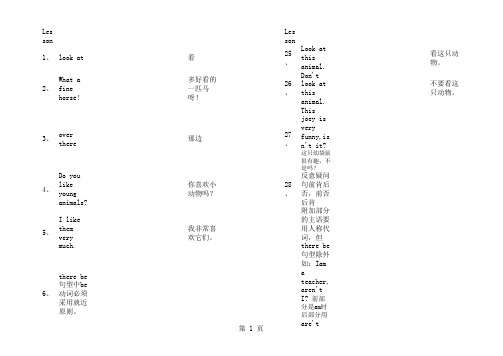
1、look at 看25、Look at this animal.看这只动物。
2、What a fine horse!多好看的一匹马呀!26、Don't look at this animal.不要看这只动物。
3、over there那边27、This joey is very funny,isn't it?这只幼袋鼠很有趣,不是吗?4、Do you like young animals?你喜欢小动物吗?28、反意疑问句前肯后否,前否后肯5、I like them very much.我非常喜欢它们。
附加部分的主语要用人称代词,但there be 句型除外6、there be 句型中be动词必须采用就近原则。
如:Iam a teacher,aren't I?前部分是am时后部分用are'tthere is +不可数名词(water milk) There will be a meeting,won't there?there is +可数名词单数回答时要前后一致。
there are +可数名词复数如:Yes,I am . No,I'm not.Lesson 2Lesson 67、What's this in English?这个用英语怎么说?29、Is this a tiger? Yes,it is. 这是只老虎吗?是的,它是。
8、It's a horse.它是horse.30、is that a lion? No,it isn't. 那是头狮子吗?不,它不是。
9、What do you call it in English?在英语中你们叫它什么呢?31、What can we call it?我们叫它什么?10、We call it a foal.我们叫它foal32、We can call it a cub.我们叫它cub。
五年级英语下册单元知识点汇总(外研版三起点)
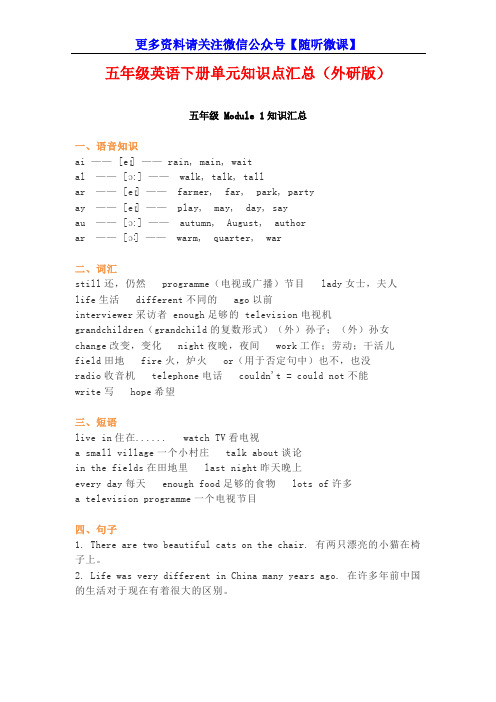
五年级英语下册单元知识点汇总(外研版)五年级 Module 1知识汇总一、语音知识ai —— [eɪ] —— rain, main, waital —— [ɔ:] ——walk, talk, tallar —— [eɪ] ——farmer, far, park, partyay —— [eɪ] ——play, may, day, sayau —— [ɔ:] ——autumn, August, authorar —— [ɔː] ——warm, quarter, war二、词汇still还,仍然programme(电视或广播)节目lady女士,夫人life生活different不同的ago以前interviewer采访者 enough足够的 television电视机grandchildren(grandchild的复数形式)(外)孙子;(外)孙女change改变,变化night夜晚,夜间work工作;劳动;干活儿field田地fire火,炉火or(用于否定句中)也不,也没radio收音机telephone电话couldn't = could not不能write写hope希望三、短语live in住在...... watch TV看电视a small village一个小村庄talk about谈论in the fields在田地里last night昨天晚上every day每天enough food足够的食物lots of许多a television programme一个电视节目四、句子1. There are two beautiful cats on the chair. 有两只漂亮的小猫在椅子上。
2. Life was very different in China many years ago. 在许多年前中国的生活对于现在有着很大的区别。
3. We lived in a small house. We didn’t have enough food. There weren’t many buses. There weren’t any televisions. 我们住在小房子了里。
人教版小学英语五年级下册各单元知识点

人教版小学英语五年级下册各单元知识点Unit 1: My dayIn this unit, students learn to talk about their daily routines and the time in English. They also learn to express their likes and dislikes about different activities.Some of the key vocabulary words and phrases include:- Get up- Have breakfast- Go to school- Have lunch- Have dinner- Watch TV- Play games- Read books- Do homework- Brush teeth- Go to bedStudents are introduced to the verb "to be" and learn how to make simple sentences with it, such as "I am happy" or "He is tired". They also practice asking and answering questions using "what", "when", and "where".Unit 2: Colors and clothesIn this unit, students learn to identify and name colors, clothing items, and accessories in English. They also learn to describe their own clothing and what they are wearing.Some of the key vocabulary words and phrases include:- Red- Blue- Green- Yellow- Orange- Purple- Pink- White- Black- T-shirt- Dress- Pants- Skirt- Shoes- Socks- Hat- Bag- SunglassesStudents learn about the use of prepositions such as "on", "in", and "under" to describe clothing and daily routines. They also practice using adjectives to describe colors and clothing, and learn to ask and answer questions such as "What color is your shirt?" and "What are you wearing today?"Unit 3: Food and drinksIn this unit, students learn to talk about different types of food and drinks in English. They also learn about healthy eating habits and meal times.Some of the key vocabulary words and phrases include:- Pizza- Sandwich- Rice- Noodles- Salad- Fruit- Vegetables- Juice- Milk- Water- Breakfast- Lunch- Dinner- SnackStudents learn about the use of countable and uncountable nouns when talking about food and drinks. They also practice using the articles "a", "an", and "the" correctly. They learn to express likes and dislikes about different foods and drinks using the verb "to like" and "to dislike".Unit 4: Holidays and festivalsIn this unit, students learn about different holidays and festivals celebrated around the world. They learn to talk about the traditions, customs, and symbols associated with these celebrations.Some of the key vocabulary words and phrases include:- Christmas- Easter- Halloween- New Year- Valentine's Day- Thanksgiving- Dragon Boat Festival- Mid-Autumn Festival- Lantern Festival- Traditions- Customs- Symbols- FireworksStudents learn to ask and answer questions about holidays and festivals. They learn to use vocabulary related to greetings, gifts, and decorations. They also practice using the verb "to celebrate" to talk about different celebrations.Unit 5: Animals and petsIn this unit, students learn about different types of animals and pets. They learn to describe their appearance, behavior, and habitat. Some of the key vocabulary words and phrases include:- Dog- Cat- Fish- Bird- Rabbit- Hamster- Snake- Monkey- Elephant- Tiger- Giraffe- Zoo- Forest- Sea- SkyStudents learn to use adjectives to describe animals, such as "cute", "fierce", or "big". They practice asking and answering questions about pets and their owners, and learn about basic pet care and responsibilities.Unit 6: Weather and seasonsIn this unit, students learn to talk about different types of weather and the four seasons. They learn to express their preferences and activities associated with each season.Some of the key vocabulary words and phrases include:- Sunny- Cloudy- Rainy- Snowy- Windy- Spring- Summer- Fall/Autumn- Winter- Sun- Rain- Snow- Leaves- FlowersStudents learn to use verbs to describe weather and activities, such as "to swim" or "to play snowballs". They also practice using simple present tense to make statements and ask questions. They learn to use adjectives to describe weather, such as "beautiful", "hot", or "cold".Unit 1: My dayIn this unit, students will be introduced to the basic vocabulary and phrases related to their daily routines and the time.The teacher can start by asking students when they usually wake up, and elicit the verb "to get up". Then, the class can work on making sentences like "I get up at 7 o'clock in the morning" or "He gets up early". The teacher can also introduce basic adverbs of frequency, such as "always", "usually", "sometimes", and "never".The class can then move on to discussing meals, such as breakfast, lunch, and dinner. Students can practice using the verb "to have" to describe what they eat and drink, such as "I have cereal and milk for breakfast" or "She has a sandwich for lunch". They can also learn to talk about their favorite foods and drinks, and use expressions like "I like" or "I don't like".The teacher can also introduce basic verbs related to daily activities, such as "to go", "to come", "to watch", "to play", "to read", and "to do". Students can learn to make sentences like "I go to school by bus" or "He plays games after school". The teacher can also teach prepositions of place, such as "at", "in", and "on", todescribe daily routines in more detail.Finally, the class can practice telling time in English, using both the 12-hour and 24-hour clock formats. Students can work on making sentences such as "It's 7 o'clock" or "It's half past nine". Unit 2: Colors and clothesIn this unit, students will learn to identify and name different colors, clothing items, and accessories.The teacher can start by introducing basic colors, such as red, blue, green, yellow, and so on. Students can practice using colors to describe different objects, such as "a red car" or "a blue shirt". The class can also work on making sentences like "I like wearing green clothes" or "She has a pink bag".Next, the teacher can introduce different types of clothing, such as T-shirts, dresses, pants, skirts, shoes, socks, hats, and bags. The class can learn to use prepositions of place to describe clothing, such as "on", "in", or "under". For example, "I wear my T-shirt under my jacket" or "She puts her shoes in the closet".The class can also learn about different accessories, such as sunglasses, watches, and jewelry. Students can practice using vocabulary to describe accessories, and make sentences like "He wears a watch on his wrist" or "She likes wearing earrings". Finally, the teacher can introduce the concept of describing what someone is wearing. The class can practice using adjectives to describe clothing, such as "casual", "formal", or "fancy". They canalso practice asking and answering questions about each other's outfits, such as "What are you wearing today?" or "Do you like my shirt?"Unit 3: Food and drinksIn this unit, students will learn about different types of food and drinks, and healthy eating habits.The teacher can start by introducing basic food vocabulary, such as pizza, sandwich, noodles, salad, fruit, and vegetables. Students can practice using the verb "to have" to describe what they eat and drink, and learn to make sentences like "I have a banana for breakfast" or "She has a salad for lunch".The class can also learn about different types of drinks, such as juice, milk, and water. They can practice using vocabulary to describe drinks and make sentences like "He drinks orange juice in the morning" or "She likes drinking milk before bed".Next, the teacher can introduce vocabulary related to meal times, such as breakfast, lunch, dinner, and snack. The class can learn to use the correct articles "a", "an", and "the" when talking about food and drink, and practice making sentences like "I have an apple for a snack" or "We eat dinner at 6 o'clock".Finally, the class can learn about healthy eating habits, such as eating fruits and vegetables, and drinking enough water. They can practice expressing likes and dislikes about different foods and drinks using the verbs "to like" and "to dislike", and learn to make sentences like "I like apples but I dislike broccoli".Unit 4: Holidays and festivalsIn this unit, students will learn about different holidays and festivals celebrated around the world.The teacher can start by asking students if they celebrate any special holidays or festivals, and elicit different types of celebrations. Then, the class can learn about some of the most common holidays and festivals, such as Christmas, Easter, and Halloween, and discuss their traditions and customs.Next, the class can learn about different traditions and symbols associated with holidays and festivals from different cultures. For example, they can learn about the dragon boat festival in China, the mid-autumn festival in Vietnam, and the lantern festival in Japan.The teacher can also introduce vocabulary related to greetings, gifts, and decorations. Students can practice making sentences like "I gave my mom a card for Mother's Day" or "We decorate the Christmas tree with ornaments". The class can also practice using the verb "to celebrate" to talk about different celebrations.Finally, the class can learn about how holidays and festivals are celebrated in different countries and cultures. They can learn about different foods, costumes, and activities associated with each celebration.Unit 5: Animals and petsIn this unit, students will learn about different types of animals andpets.The teacher can start by asking students what animals they like or dislike, and elicit different types of animals. Then, the class can learn to identify and name different animals, such as dogs, cats, fish, birds, and so on.Next, the class can learn about different types of pets, such as dogs, cats, hamsters, and rabbits. They can practice using vocabulary to describe pets and make sentences like "I have a dog named Max" or "She likes to play with her cat".The teacher can also introduce vocabulary related to animal behavior, such as "cute", "fierce", or "friendly". The class can learn to use adjectives to describe animals, and practice making sentences like "The tiger is fierce but the bunny is cute".Finally, the class can learn about basic pet care and responsibilities. They can learn about feeding, grooming, and playing with pets, and practice making sentences like "I walk my dog every evening" or "She cleans her fish tank every week".Unit 6: Weather and seasonsIn this unit, students will learn to talk about different types of weather and the four seasons.The teacher can start by asking students what their favorite season is, and elicit different types of seasons. Then, the class can learn to identify and name different types of weather, such as sunny, cloudy, rainy, and snowy.Next, the class can learn about the different activities and events associated with each season. For example, they can learn about swimming and camping in the summer, apple picking and Halloween in the fall, skiing and ice skating in the winter, and gardening and Easter in the spring.The teacher can also introduce basic verbs related to weather and activities, such as "to swim", "to play", or "to ski". Students can practice making sentences like "I swim in the lake on hot days" or "She skis with her family in the winter".Finally, the class can learn to express their preferences and dislikes about each season, using expressions like "I love spring because of the flowers" or "I don't like winter because it's too cold". They can learn to use adjectives to describe weather, such as "beautiful", "hot", or "cold", and practice asking and answering questions using simple present tense.。
人教版PEP小学英语五年级下册unit1至unit3知识点归纳
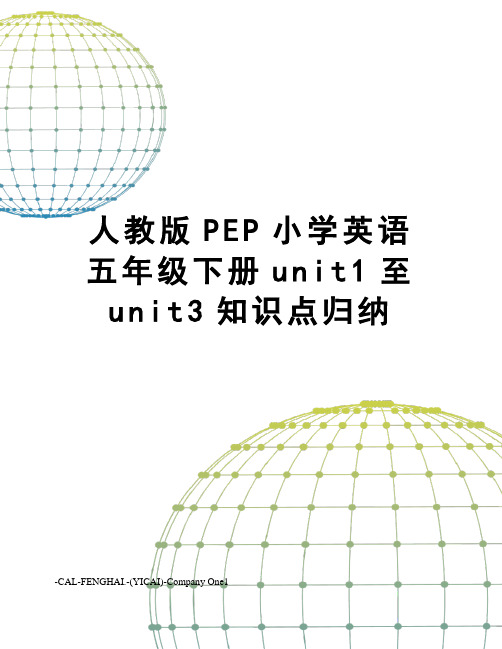
人教版P E P小学英语五年级下册u n i t1至u n i t3知识点归纳-CAL-FENGHAI.-(YICAI)-Company One1五年级下册Unit 1-3重点难点、单元单词、短语和知识点知识梳理第一单元知识点一、主要单词:do morning exercises晨练,做早操 eat breakfast吃早饭 have English class上英语课 play sports进行体育活动 eat dinner吃晚饭 eat lunch吃午饭 climb mountains爬山 go shopping购物,买东西 play the piano弹钢琴 visit grandparents看望(外)祖父母 go hiking去远足二、主要句子:When do you eat dinner你什么时候吃晚饭I eat dinner at 7:00 in the evening.我晚上七点吃晚饭。
When do you get up你什么时候起床I usually get up at 12:00 at noon.我通常在中午12点起床。
What do you do on the weekend你在周末干什么Usually I watch TV and go shopping.我通常看电视和购物。
Sometimes I visit my grandparents.有时候我去看望我的外祖父母。
I often play football.我经常踢足球。
Sometimes I go hiking.有时候我去远足。
三、同义词eat breakfast—have breakfast eat lunch—have luncheat dinner—have dinner play sports—do sports usually—often复数形式:policeman—policemen policewoman—policewomen现在分词:tell—telling三单:say—says同义句:What do you do ---What are you你是干什么的四、表示频度的副词:always总是,一直 usually通常,常常 often经常 sometimes有时候五、以复数形式出现的词组:visit grandparents plant trees介词后跟表示时间的词语时,表示在某年、某月、某个季节,某个时候(在上午,在下午,在晚上)用in;表示在某一天,在星期几用on,在具体的几点几分用at.七、too 和either的用法区别:too和either都是“也”的意思,但too用于肯定句,either用于否定句。
部编英语五年级下册总复习各单元课文知识点归纳汇总(1)

部编英语五年级下册总复习各单元课文知识点归纳汇总(1)本文档旨在对部编英语五年级下册的各单元课文知识点进行归纳和汇总,以供复参考。
以下是各单元的知识点概述:第一单元:Shall we celebrate?- 本单元主要介绍了不同节日的庆祝方式和表达祝福的方式。
学生需要学会用英语表达自己参加节日庆祝、提出庆祝活动和表达祝福的能力。
第二单元:My family- 本单元以介绍家庭为主题,学生需要研究家庭成员的称呼,能够介绍自己的家庭以及问询别人的家庭情况。
第三单元:An old man and a hat- 本单元以故事《一个老人和一顶帽子》为主,旨在培养学生的阅读理解能力和语言表达能力,引导他们用简单、流畅的语言阅读并理解故事。
第四单元:Music Time- 本单元主要研究音乐的基本概念和表达方式,学生需要学会用英语表达自己对音乐的喜好和感受。
第五单元:My pet- 本单元以宠物为主题,学生需要研究描述自己宠物的外貌特征、性格以及与宠物的相处之道。
第六单元:Wild animals- 本单元主要介绍了各种野生动物,学生需要学会描述动物的外貌特征和性,以及人与动物的相处之道。
第七单元:At the zoo- 本单元以动物园为背景,学生需要学会用英语描述动物园的各种场景和动物。
第八单元:Going to the countryside- 本单元以乡村生活为主题,学生需要学会用英语描述乡村的风景、农作物种植、乡村生活等方面的内容。
第九单元:Why is the fire hot?- 本单元以“火”为话题,学生需要学会用英语描述火的特点、危害和灭火方法。
第十单元:At the amusement park- 本单元以游乐园为背景,学生需要学会用英语描述游乐设施、游乐活动以及和朋友一起游玩的情景。
以上是部编英语五年级下册各单元课文知识点的概括和归纳,希望对同学们的复有所帮助。
(完整版)人教版小学PEP英语五年级下册知识点归纳

人教版小学PEP英语五年级下册知识点归纳PEP五年级英语下册各单元知识点Unit 1 My day一、重点词汇。
1.四会词汇:eat breakfast 吃早饭 have···class 上······课play sports 进行体育运动exercise 活动;运动 domorning exercises做早操eat dinner吃晚饭clean my room 打扫我的房间go shopping 去买东西;购物go for a walk 散步take学习;上(课) dancing跳舞;舞蹈 take a dancing class 上舞蹈课2. 三会词汇:when什么时候after 在(时间)后start 开始usually 通常地;惯常地Spain 西班牙late 晚;迟 a.m. 午前;上午 p.m. 午后;下午why 为什么shop 去买东西;购物work 工作last 上一个的;刚过去的sound 听起来好像also 还;也busy 忙的 need 需要play 戏剧;剧本letter 信live 居住island 岛always 总是;一直cave 山洞;洞穴go swimming 去游泳 win 获胜二、其他日常活动。
get up起床 eat lunch吃午饭 go to bed 上床睡觉wash my face洗脸 wash my clothes 洗我的衣服 watch TV看电视play ping-pong打乒乓球 playthe pipa弹琵琶 go swimming去游泳go running去跑步 do homework 做作业 do kung fu练武术play football踢足球 play basketball打篮球三、频度副词。
always总是,一直(100%) usually通常(80%)often 经常(60%) sometimes(30%)有时四、疑问词。
PEP小学英语五年级下册各单元要点总结
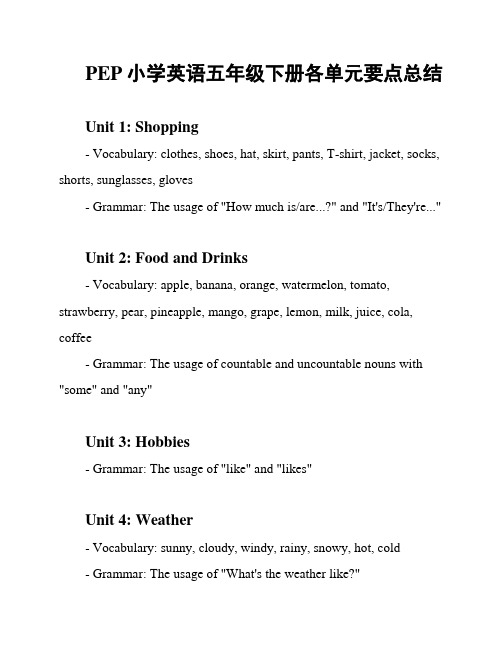
PEP小学英语五年级下册各单元要点总结Unit 1: Shopping- Vocabulary: clothes, shoes, hat, skirt, pants, T-shirt, jacket, socks, shorts, sunglasses, gloves- Grammar: The usage of "How much is/are...?" and "It's/They're..."Unit 2: Food and Drinks- Vocabulary: apple, banana, orange, watermelon, tomato, strawberry, pear, pineapple, mango, grape, lemon, milk, juice, cola, coffee- Grammar: The usage of countable and uncountable nouns with "some" and "any"Unit 3: Hobbies- Grammar: The usage of "like" and "likes"Unit 4: Weather- Vocabulary: sunny, cloudy, windy, rainy, snowy, hot, cold- Grammar: The usage of "What's the weather like?"Unit 5: Classroom- Vocabulary: desk, chair, blackboard, eraser, pencil, ruler, book, pen, bag, sharpener, glue, scissors- Grammar: The usage of prepositions "on", "in", and "under"Unit 6: Daily Routines- Vocabulary: get up, have breakfast, brush teeth, go to school, have lunch, do homework, have dinner, take a bath, go to bed- Grammar: The usage of present simple tense with daily routinesUnit 7: Jobs- Vocabulary: doctor, teacher, driver, police officer, firefighter, chef, engineer, artist, musician, journalist, scientist, astronaut- Grammar: The construction "What does he/she do?" and the usage of adjectives to describe jobsUnit 8: Animals- Vocabulary: dog, cat, bird, fish, rabbit, monkey, tiger, lion, elephant, panda, giraffe, snake, kangaroo- Grammar: The usage of "Can" to talk about abilitiesUnit 9: Festivals- Vocabulary: Spring Festival, Christmas, Thanksgiving, Easter, Halloween, Lantern Festival, Dragon Boat Festival, Mid-Autumn Festival, National Day- Grammar: The usage of "When is...?" and the construction "I like... because..."Unit 10: My City- Vocabulary: park, supermarket, hospital, school, post office, bank, library, restaurant, cinema, zoo, museum, airport, train station, subway - Grammar: The usage of prepositions "near", "next to", and "between"以上是PEP小学英语五年级下册各单元的要点总结。
- 1、下载文档前请自行甄别文档内容的完整性,平台不提供额外的编辑、内容补充、找答案等附加服务。
- 2、"仅部分预览"的文档,不可在线预览部分如存在完整性等问题,可反馈申请退款(可完整预览的文档不适用该条件!)。
- 3、如文档侵犯您的权益,请联系客服反馈,我们会尽快为您处理(人工客服工作时间:9:00-18:30)。
人教PEP五年级下册Unit1知识汇总一、词汇eat breakfast 吃早饭have…class 上……课exercise 活动;运动play sports 进行体育活动 do morning exercises 做早操eat dinner 吃晚饭 clean my room 打扫我的房间go for a walk 散步go shopping 去买东西;购物 take 学习;上(课) dancing 跳舞;舞蹈 take a dancing class 上舞蹈课when 什么时候;何时 after 在(时间)后 start 开始usually 通常地;惯常的 Spain 西班牙 late 晚;迟a.m. 午前;上午 p.m. 午后;下午 why 为什么shop 去买东西;购物work 工作 last 上一个的;刚过去的sound 听起来好像also 还;也 busy 忙的need 需要play 戏剧;剧本letter 信 live 居住island 岛always 总是;一直cave 山洞;洞穴 go swimming 去游泳win 获胜二、句子1. -- When do you get up? 你什么时候起床?-- I often get up at 7 o’clock. 我经常在七点钟起床。
2. -- When do you finish class in the morning?你们上午的课什么时候结束?-- We finish class at 1 o’clock. 我们一点钟课程结束。
3. Classes start at 3 o’clock. 三点钟开始上课。
4. -- When do you usually eat dinner in Spain?你在西班牙通常什么时候吃晚饭?-- Usually at 9:30 or 10 o’clock. 通常在九点三十分或十点钟。
5. That’s too late! 那太晚了!6. -- When do you do morning exercises? 你什么时候做早操?-- At 7 o’clock. 在七点钟。
7. -- Why are you shopping today? 今天你为什么购物? -- My mum worked last night. So I’m shopping today.我妈妈昨晚工作了,所以今天我购物。
8. -- What do you do on the weekend? 你在周末做什么? -- I often watch TV and play ping-pong with my father.我经常看电视,也常和我爸爸一起打乒乓球。
9. That sounds like a lot of fun. 那听起来好像很有趣。
10. I usually wash my clothes. Sometimes I cook dinner.我通常洗衣服。
有时我做晚饭。
11. You’re so busy! 你真忙!12. I often clean my room on Saturdays! 我经常在星期六打扫我的房间!三、句型结构1. -- When do you + 动词(短语)原形(+其他)?-- I/ We(+频度副词)+动词(短语)原形+at+时间。
e.g: -- When do you go to school everyday? 你每天什么时候去学校?-- I go to school at 7 o’clock. 我七点去学校。
2. -- What do you do on the weekend?-- I/ We(+频率副词)+动词原形(+其他).e.g: -- What do you do on the weekend? 你在周末做什么?-- I often read books. 我经常读书。
3. Why are you + 动词-ing形式+其他?e.g. : Why are you cleaning your room?人教PEP五年级 Unit2知识汇总一、词汇spring 春天 summer 夏天 autumn 秋天 winter 冬天season 季节 picnic 野餐 go on a picnic 去野餐pick 摘;采集pick apples 摘苹果snowman 雪人make a snowman 堆雪人 go swimming 去游泳 which 哪一个best 最;最高程度地 snow 雪good job 做得好because 因为vacation 假期all 全;完全 pink粉色;粉色的lovely 可爱的;美丽的leaf 叶子(复数leaves)fall 落下;【美】秋天 paint 用颜料绘画二、句子1. -- Which season do you like best? 你最喜欢哪个季节? -- Autumn. 秋天。
2. Look at my picture. 看我的画。
3. Classes start at 3 o’clock. 三点钟开始上课。
4. I like summer best because of Children’s Day.我最喜欢夏天,因为儿童节。
5. -- What do you do often do in summer? 你在夏天经常做什么?-- I often go swimming. 我经常去游泳。
6. Good job! 做得好!7. I like the trees. The colour is very pretty! 我喜欢这些树。
颜色很漂亮!8. I like autumn best. 我最喜欢秋天。
9. The weather is good and the colours are beautiful!天气很好,颜色很漂亮!10. -- Why? 外什么?-- Because I like summer vacation. 因为我喜欢暑假。
三、句型结构1. -- Which season do you like best?-- I like + 季节+ best. / 季节.e.g: -- Which season do you like best? 你最喜欢哪个季节?-- I like spring best. 我最喜欢春天。
2. -- Why (do you like + 季节)?-- Because + 原因.e.g: -- Why do you like spring? 你为什么喜欢春天?-- Because there are beautiful flowers everywhere.因为到处都有美丽的花。
人教PEP五年级 Unit3知识汇总一、词汇January 一月 February 二月 March 三月 April 四月 May 五月 June 六月 July 七月 August 八月September 九月 October 十月 November 十一月December 十二月 few 不多;很少 a few 一些thing 事情meet 集会;开会sports meet 运动会Easter 复活节 trip 旅行 year 年 plant 种植contest 比赛;竞争the Great Wall 长城national 国家的National Day 国庆日 American 美国的 Thanksgiving 感恩节Christmas 圣诞节holiday 假日;节日game 游戏roll 滚动 look for 寻找 chocolate 巧克力bunny(用作儿语)兔子 RSVP(尤用于请柬)请赐复by 在……之前二、句子更多内容请关注微信公众号:xscyy1001. -- When is the summer vacation? 暑假是什么时候?-- It’s in July and August. 它在七月和八月。
2. -- When is Tree Planting Day? 植树节是什么时候?-- It’s in March. 它在三月。
3. We have a school trip, too. 我们也有一次学校郊游。
4. Cool! 太酷了!5. I like autumn. I really like the colours.我喜欢秋天。
我真的喜欢那些颜色。
6. We usually have a school trip in autumn.我们在秋天通常有一次学校郊游。
7. -- When is the trip this year? 今年的郊游是什么时候?-- It’s in October. 它在十月。
8. We’ll go to the Great Wall. 我们将去长城。
三、句型结构1. -- When is + 活动/节日?-- It’s in + 月份.e.g: -- When is the sports meet? 运动会是什么时候?-- It’s in April. 它在四月。
2. 主语+will+动词原形(+其他).e.g: I will go hiking with my friends. 我将和我的朋友去远足。
人教PEP 五年级 Unit4知识汇总一、词汇first (1st) 第一(的) second (2nd) 第二(的) third (3rd) 第三(的) fourth (4th) 第四(的) fifth (5th) 第五(的)twelfth (12th) 第十二(的) twentieth (20th) 第二十(的)twenty-first (21st) 第二十一(的) twenty-third (23rd) 第二十三(的) thirtieth (30th) 第三十(的) special 特殊的;特别的fool 蠢人;傻瓜 kitten 小猫 diary 日记 still 仍然;依旧;还是 noise 声音;响声;噪音fur(某些动物的)浓密的软毛 open开着的 walk行走二、句子1. -- When is Mother’s Day? 母亲节是哪天?-- It’s on the second Sunday in May. 它在五月的第二个星期日。
更多内容请关注微信公众号:xscyy1002. Happy birthday! 生日快乐!3. -- When is Mid-Autumn Day this year? 今年的中秋节是哪天?-- September 27th. 9月27日。
4. -- What do you usually do on Mid-Autumn Day?你们通常在中秋节做什么?-- We eat mooncakes. 我们吃月饼。
